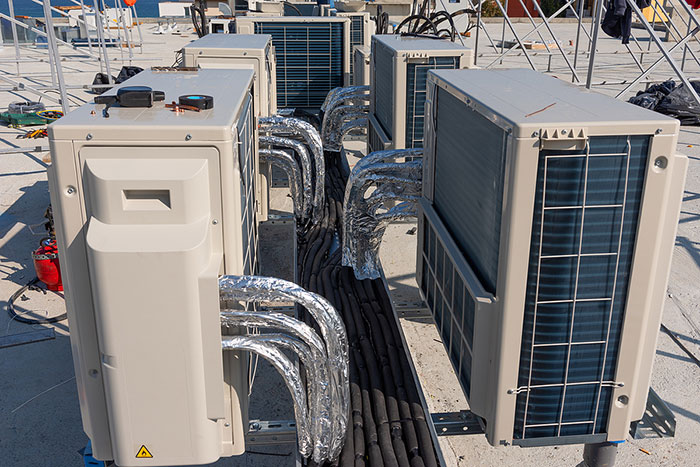Heating, ventilation, and air conditioning (HVAC) systems help to control the temperature conditions inside buildings and homes, allowing people to easily make adjustments to heat or cool a space, as desired, depending on the current weather conditions and the time of year. HVAC units can come in various forms, shapes, sizes, and types, with each one offering its own advantages and optimal uses.

The HVAC system industry is worth close to $250 billion, according to the latest figures, and HVAC systems play an essential role in the lives of countless people, each and every day, so it’s worth taking some time to learn how they function and why it’s so important to buy good quality HVAC hardware and supplies.
HVAC for Heating
Let’s begin by looking at how heating-oriented HVAC systems operate, taking a closer look at each of the individual components to learn more. These systems are designed to warm up space when cold weather comes along, keeping the inhabitants feeling warm and cozy all through the winter.
Blower
In an HVAC heating unit, cool air enters the system, gets heated up, and then gets blown out via the ductwork around the building. The blower is what pushes the air around, keeping the circulation process going.
Heat Exchanger
The heat exchanger is one of the most important parts of an HVAC heating unit, working to heat up the cool air entering the system to help it circulate around the home. Heat exchangers can suffer cracks or damages over the years, preventing them from working as well, which is why regular HVAC check-ups and maintenance tests are essential.
Fuel Valve
If your heating unit relies on natural gas, this valve helps to allow that gas to enter the system and burn to produce heat. The valve is integral to the overall functioning of the unit, and a faulty valve can cause a lot of issues if it can’t be tuned properly to allow gas to pass through.
Air Filters
As air enters the system, it usually passes through a filter which helps to remove dust, dirt, and other unwanted elements like allergens too, essentially helping to improve the quality of the air circulating around the building and being breathed in by its inhabitants. Over time, filters can get dirty and clogged up, so usually need to be cleaned or replaced.
HVAC for Cooling
As well as heating units, you can also find HVAC units dedicated to cooling, making use of air conditioning to cool down space, ideal for hot and humid regions. It works with the use of various components, including a compressor and condenser to essentially suck heat and humidity out of the air and blow cooler, fresher air around the building. Key parts include the following:
Compressor
The compressor makes use of a motor to transform a liquid refrigerant into a gas and then pushes it through the system to transport heat energy from one place to another. It plays a key role in cooling down the air.
Condenser
The condenser is equally important, allowing the refrigerant gas to transform back into its liquid state in order for the cooling process to begin once more, as well as helping to push the accumulated heat energy out of the building.
Evaporator
The evaporator is formed in a coil-like structure. Warm air passes over this coil, which contains the refrigerant, which takes heat and humidity out of the air to cool it down. Just like other parts of HVAC units, evaporators can suffer from faults, failures, and damages as time goes by, so it’s important to check up on them often.
HVAC Delivery
Whether you’re working with a cooling unit or a heating unit, it’s important for any HVAC system to have some form of delivery method to carry the cool or warm air around the home. This is usually in the form of ductwork, which can be quite large and extensive in big buildings. Again, ducts can get damaged or deteriorate over the years, with little leaks and cracks allowing air to escape.
Final Word
HVAC units play such a big part in our lives, allowing us to enjoy high standards of comfort and adequate, pleasing temperatures, no matter what time of year it happens to be or how the weather is looking outside. Understanding how these systems function can help you appreciate their effects more strongly, as well as knowing how vital it is to get them checked over by professionals and fixed as soon as possible if any issues occur.
